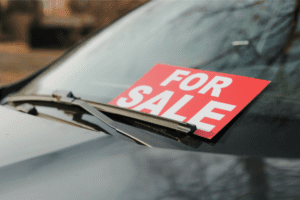Car depreciation is unavoidable, but there are ways in which you can avoid or slow down the rate at which your car depreciates. It can start as early as the car-buying process and runs right through to ownership. Car depreciation is the rate at which your car’s value decreases over time. It is the difference between how much you paid for the car at the time of buying and how much the car is worth when you come to sell it.
If you’re still unsure, check out our blog on car depreciation and how it works.
How to slow down your car’s depreciation:
Car depreciation can be affected by a whole range of factors. Not only can the car you choose affect depreciation rates, but also how you run it. Our easy 8-step guide is here to help you reduce the rate of depreciation and learn how depreciation affects a car’s value.
1. Choose the right car.
Choosing a slow-depreciating car can be the key to protecting your money in the long run. Some cars tend to depreciate faster than others, and choosing the right make and model is important. During the car buying process, it can also be good to consider cars which have low running costs, good fuel economy, and strong reliability. These cars tend to hold their value for longer and can help you to save money on owning and running a car, too!
The slowest depreciating cars
2. Buy a used car.
Buying a used car is a great way to avoid car depreciation. Used cars depreciate more slowly because much of the depreciation has already taken place. Brand new cars can lose up to 40% of their value in the first year of ownership! So, buying a used car can help you save money in the long run. Depreciation typically slows after 3 years of ownership, so opting for a used car that is only a few years old can be a good idea.
3. Drive safely.
Once you’ve bought your slow-depreciating used car, it’s time to look after it! Crashing your car or being involved in a road accident which damages your vehicle will reduce the value of your car. No matter how minor the damage is, it can still increase the depreciation rate of your car. Careful, considerate driving is the key to avoiding road incidents and accidents.
4. Keep mileage low.
Sometimes it can be hard to avoid unnecessary miles on your car, but keeping your mileage as low as possible can help reduce the rate of car depreciation. Low mileage means the car is likely to be in better condition and has been looked after by the driver. Granted, you did buy your car to be able to get around with ease, but it can be worth considering if you really need to use your car for every journey.
5. Get regular servicing and MOTs.
Keeping your car in its best condition possible is an easy way to reduce the rate of depreciation. Keeping on top of annual MOTs and having your car serviced regularly can help it hold its value. Not only that, but both can help to improve safety, prevent breakdowns, improve longevity and fuel efficiency. All cars over 3+ years old are required by law to have a valid annual MOT, and car servicing should be performed every year or 10,000 miles, whichever comes first.
6. Use manufacturer-recommended parts.
When it comes to having something renewed or replaced on your beloved car, you may not have the budget to get manufacturer-recommended parts. Typically, they are the most expensive to buy, but they can help to save you money in the long run. Using manufacturer-recommended parts, such as Audi, BMW, Citroen, or Mercedes, can help reduce depreciation and help to improve the condition of your vehicle. Manufacturer-recommended parts can also guarantee quality and compatibility with your vehicle, whilst improving its safety and performance.
7. Don’t make any modifications.
Whilst modifying your car may be attractive, it can actually hinder the value of your car. Modifications are personal, and doing too much can mean there’s a smaller pool of people who would be interested in buying your car when you’re finished with it. Some modifications, such as spoilers or noisy exhausts, can have a negative perception and are commonly associated with high mileage and rapid acceleration.
8. Sell at the right time.
The time of year you decide to sell can also affect how much your car is worth. Keeping up to date with supply and demand is key to getting a good deal. For example, selling a convertible car in the winter may not be attractive to buyers. Also, selling your car just after the new registrations come out in March or September can reduce how much you could get for your vehicle.
Related Content:

How to buy your first car – the easy way!
If you’ve recently passed your test, we understand that buying your first car can be exciting but nerve-racking!

When will UK used car prices come down?
So far this year, used car prices seem to have dropped, but will they continue to come down?

Top 10 fuel-saving tips.
Our latest blog below looks at how to save fuel when driving and what will reduce fuel consumption!